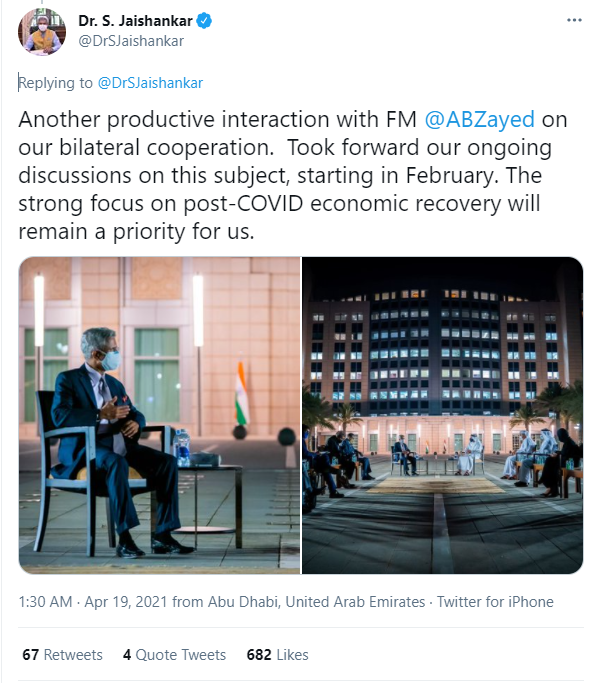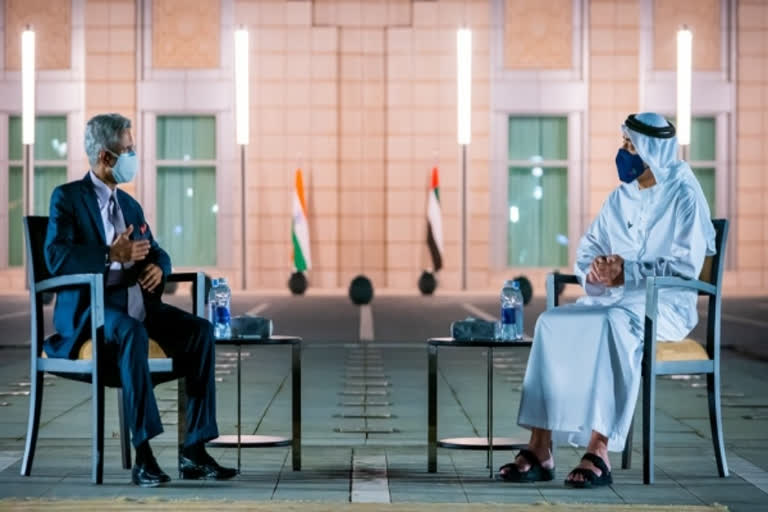Abu Dhabi: External Affairs Minister S Jaishankar held another round of "productive interaction" with his UAE counterpart Sheikh Abdullah bin Zayed Al Nahyan here where the two leaders discussed the entire gamut of bilateral relations, especially the strong focus on economic recovery post-COVID-19.
Jaishankar arrived in Abu Dhabi on Sunday with a focus on boosting bilateral economic cooperation. His visit to the United Arab Emirates comes amid evolving geopolitical developments in the region, particularly in Afghanistan.
"Another productive interaction with FM @ABZayed on our bilateral cooperation. Took forward our ongoing discussions on this subject, starting in February. The strong focus on post-COVID economic recovery will remain a priority for us," he said in a tweet late on Sunday along with a picture of them holding a meeting outdoors.

According to UAE's official WAM news agency, the two leaders discussed ways to develop and enhance bilateral cooperation in all domains, in a way that will fulfil the aspirations of the leadership of India and the UAE and benefit their peoples.
Emphasising on the historic ties between the two nations, Sheikh Abdullah said that the UAE-India strategic partnership contributes to creating more opportunities for growth in commercial, economic, cultural and other fields.
They also deliberated the latest COVID-19 developments, the two countries' efforts to contain its repercussions, and the global efforts to provide vaccines to all countries, WAM reported.
Sheikh Abdullah also praised the cooperation between the two countries to mitigate the impacts of the pandemic, it said.
READ: Also Read: The world needs plurilateralism as multilateralism has fallen short: EAM Jaishankar
The UAE foreign minister visited New Delhi on February 26 and held talks with Jaishankar.
Jaishankar earlier paid a two-day visit to the UAE from November 25 to 26 last year in the midst of the coronavirus pandemic.
Interestingly, Jaishankar's visit to Abu Dhabi coincided with the trip of his Pakistani counterpart Shah Mahmood Qureshi, amid efforts by the Gulf emirate to facilitate back channel talks to restart dialogue between New Delhi and Islamabad.
Jaishankar's current visit to Abu Dhabi comes days after the Emirati ambassador to the US Yousef al-Otaiba said that the UAE played a role in bringing down the tension between India and Pakistan and getting their bilateral ties back to a "healthy functional relationship".
"They might not sort of becoming best friends but at least we want to get it to a level where it's functional, where it's operational, where they are speaking to each other," al-Otaiba said during a virtual discussion with Stanford University's Hoover Institution on Wednesday.
Qureshi is in the UAE on a three-day visit during which he will hold discussions with the country's leadership on all areas of bilateral cooperation including collaboration in trade and investment.
In Islamabad, Pakistan's Foreign Office said that Qureshi will meet his counterpart Sheikh Abdullah bin Zayed Al Nahyan and other UAE dignitaries.
The visits of the two leaders are leading speculation as UAE's foreign minister will hold talks with his counterparts from India and Pakistan.
India and Pakistan in a surprise announcement said on February 25 that they have agreed to strictly observe all agreements on ceasefire along the Line of Control (LoC) in Jammu and Kashmir and other sectors.
When asked about the media reports of backchannel talks between India and Pakistan, External Affairs Ministry spokesperson Arindam Bagchi did not give a direct reply.
"If you talk about channels of communication on this issue, let me just recall that our respective high commissions exist and are functioning. So that is a very effective channel of communication," Bagchi said on April 9.
READ: Afghanistan needs double peace: EAM Jaishankar in Raisina Dialogue
India has told Pakistan that it desires normal neighbourly relations with Islamabad in an environment free of terror, hostility and violence. India has said the onus is on Pakistan to create an environment free of terror and hostility.
On the same day, Pakistan Foreign Office spokesman stopped short of categorically denying its involvement in some kind of backchannel talks with India.
Foreign Office spokesperson Zahid Hafeez Chaudhry at the weekly press briefing on April 9 was asked by several journalists about reported backchannel talks with India.
Instead of rejecting it outrightly he said: "States have their ways and means to communicate which remain available even during wars. Therefore, whether any talks are taking place between India and Pakistan is not important."
He added that the real issue was what should be discussed between the two countries and how the dialogue could be made meaningful and result-oriented dialogue.
Ties between India and Pakistan nose-dived after a terror attack on the Pathankot Air Force base in 2016 by terror groups based in the neighbouring country.
Subsequent attacks, including one on Indian Army camp in Uri, further deteriorated the relationship.
The relationship dipped further after India's war planes pounded a Jaish-e-Mohammed terrorist training camp deep inside Pakistan on February 26, 2019 in response to the Pulwama terror attack in which 40 CRPF jawans were killed.
READ: EAM Jaishankar to visit Abu Dhabi
The relations deteriorated after India announced withdrawing special powers of Jammu and Kashmir and bifurcation of the state into two union territories in August, 2019.
Last month, Pakistan's powerful Army chief General Qamar Javed Bajwa said that it was time for India and Pakistan to "bury the past and move forward as he asserted that the peace between the two neighbours would help to "unlock" the potential of South and Central Asia.
The powerful army, which has ruled Pakistan for more than half of its 72 plus years of existence, has hitherto wielded considerable power in the matters of security and foreign policy.
Gen Bajwa's remarks came a day after Prime Minister Imran Khan made a similar statement.
AGENCY INPUTS



